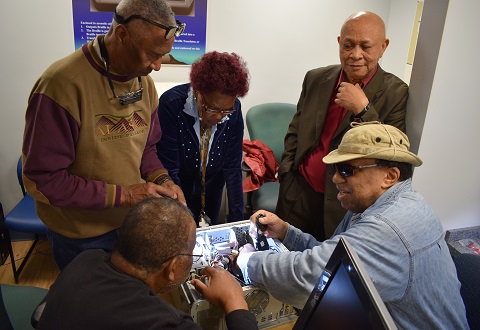Rehabilitation and Prosthetic Services
Vet Squad – The DC VAMC Computer Repair Team

Left to right; Gregory Johnson, Marvin Bailey, Katie Taylor, Udobi Ikeji, and George Hill inspect a computer chassis and motherboard to determine if it can be repurposed for other another use.
Computers can be intimidating to repair with few people taking on the challenge to open their own machines when things go wrong and even fewer building new machines from scratch. In some ways, working on computers is similar to auto repair with most people choosing to leave this work to professionals.
Having the talent to build these complex systems is rare and being able to do it with limited or low vision is almost unheard of – unless you are a Veteran at the Washington, D.C. VA Medical Center.
Led by Blind Rehab Therapist Udobi Ikeji, Veterans of DCVAMC Computer Access Users Group meet twice a month to build new machines from brand new or donated hardware. Using tactile techniques and Assistive Technology such as magnification with a video camera connected to a CCTV these Veterans are able to evaluate donated hardware to determine if and how it can be repurposed.
Most recently, the group took apart a system built primarily as an entertainment center and identified what components were reusable in a new system.
“This is a complex task when you have to feel for the components to determine how they have been fastened in order to loosen them without damage,” said Ikeji. “Repurposing is a better word than refurbishing for what this group does because the purpose defines the specifications of the final product.”
Beyond building the hardware of new machines, these Veterans are also involved with software, computer security, system backup and restoration, and creating systems that will aid the blind keep up with emerging and trending technologies.
The group work is especially helpful because these blind and low vision computer users face unique hardware and software challenges that are best resolved by working with similar Vets to share their experiences and solutions.
Here is what some of the participants say -
“This group gives me great comfort and joy when I interact with other veterans with varying degrees of knowledge and skills, collaborating to produce systems that are useful to other people. It’s not only about technology, it’s about the love and comradeship” – Katie Josephine Taylor.
The computer access technology users group meets twice a month to increase their skills, discuss trending technologies and resolve current technical issues.
As with most hobby projects, funding is a challenge. As an incentive, a project funder is able to keep the finished project, which means most of the work is from material donated by group members. However, the work sometimes goes beyond the DC Metro Area. In 2016, the DCVAMC Computer Access Users Group built a system which was donated to a charitable organization for a community library project in South Eastern Nigeria. Funding is always a challenge and we will always welcome a new barebones kit or donation of a new component.
This program is a component of the Visually-Impaired Services Outpatient Rehabilitation (VISOR) Program. Beyond computer repair this program also assesses the technical needs of Veterans, recommends, configures sets up and trains Veterans to use computers, smart phones and other devices.
Learn more about VHA Blind Rehabilitation at: www.rehab.va.gov/blindrehab



















